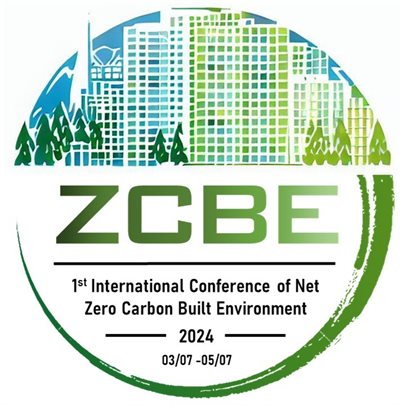We are delighted to extend a warm welcome to all participants of the International Conference of Net Zero Carbon Built Environment (ZCBE) in 2024.
The ZCBE 2024 will be held on 3-5th July 2024 in the city of Nottingham, UK. The three-day event is jointly organised by the University of Nottingham, University of Adelaide, Technical University of Crete, and Pennsylvania State University supported by Renewable Energy and Solar Energy Advances.
Quick links
The urgency to address climate change and achieve global sustainability goals has never been greater. The built environment plays a crucial role, as buildings and construction sectors combined are responsible for 40% of global energy use and 37% of global CO2 emissions.
Buildings constructed prior to the establishment of energy performance standards are often energy-inefficient or using inadequate heating and cooling systems. As a result, they require a substantial amount of energy for heating, cooling, and lighting, leading to high energy bills for occupants and significant CO2 emissions. To combat this, many countries have targeted to achieve the carbon neutrality goal by 2050 thus necessitating all new buildings from 2020 to be Nearly Zero-Energy Buildings (NZEB), with further policy driving buildings to be net energy generators, i.e. they should generate more energy than they use.
NZEBs aim to significantly reduce energy demand and meet remaining energy needs from renewable sources. The principle behind NZEBs is not just about reducing energy consumption to achieve comfortable and healthy buildings, but also about producing sustainable energy on-site or nearby, leading to a balance of the energy consumed and the energy produced on an annual basis. Achieving NZEBs can lead to a net-zero carbon built environment not only at the building level but also at the community, precinct, city and regional levels.
With a primary focus on the net zero carbon built environment, the ZCBE 2024 aims to provide a platform for knowledge exchange for internationally leading researchers, industrial experts and policy makers to share recent advances, experience and expertise in the area of net zero carbon built environment and its associated studies. Together, we can fuel the advancement towards a carbon-neutral and greener future.

The ZCBE 2024 will include keynote and invited speeches, plenary sessions, oral presentations, and poster sessions on the below topics, but is not limited to:
- Advances in renewable energy technology
- Energy storage and integration in the built environment
- Low carbon communities
- Health and wellbeing in the built environment
- Innovative building design, materials and construction
- Net zero carbon building and environmental assessment and certification
- Decarbonisation of the building stock
We are pleased to announce outstanding papers will be considered for full publication in two special issues for Renewable Energy and Solar Energy Advances.
For detailed and updated information on the conference please email the Organising Chairs.
We look forward to welcoming you to Nottingham.